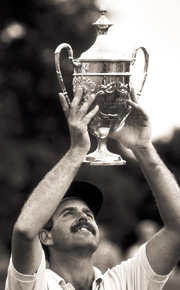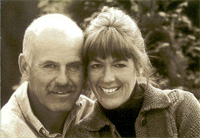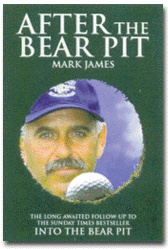This is the personal story of Mark James, Ryder Cup Golfer and testicular cancer survivor. It is from our series Living Proof - about real people who have had cancer; real cancer survivors. (Originally published in October 2002 icon)
Testicular Cancer - The Facts

After the Bear Pit
Book Review
In his new book After the Bear Pit, Ryder Cup golfer, Mark James, tells how he fought and won the battle against testicular cancer.
Chris Woollams, a keen golfer himself, reviews the book.
Mark James Wins His Toughest Contest
I am one of approximately one and a half million Britons known to walk six miles whilst occasionally trying to hit a small white round thing into a slightly larger brown thing. I do this three times a week or so. My handicap is in single figures. (For those of you who don’t know, a handicap is a scientific measurement of your propensity to swear on a golf course. The higher your handicap, the more you swear).
However, despite my enjoyment of the game, I am not a zealot. I don’t sit glued to the Open nor read books on how to improve my swing. I’m also very bad at remembering golf jokes and I don’t wear sweaters with big diamond motifs on them. To read books like After the Bear Pit, it helps if you are a zealot.
But for readers of this magazine, the account over the first 40 pages or so, of Mark’s battle with cancer and, interestingly, the last chapter, his wife’s story of the same battle will be the most relevant.

The words when they came from a soft and unemotional voice, were delivered with care and consideration

Everyone touched by cancer will appreciate the shock in the opening sentences of the book:
"The words when they came from a soft and unemotional voice, were delivered with care and consideration.
"They still hit me with all the force of a wrecking ball. ’It looks like lymphoma.’ Just four words and my worst fears were realised."
In fact, it turned out to be not lymphoma but testicular cancer, but the emotions remain the same.
It began in the summer of 2000 when Mark James, 48, returned from a family holiday in Southern Spain. Golfers often have backache, it goes with the job, but Mark started getting it after meals.
"The first symptoms developed at the Scottish PGA between 24 and 27 August. I do tend to have a healthy appetite, but suddenly I began to experience discomfort in the form of backache immediately after dinner. There was not too much to worry about, because I had had a couple of vertebrae slip out of position earlier in the year and was prone to the odd twinge.
By mid-September my general condition was starting to deteriorate. I was now getting aches and pains more consistently during the day, although it was still worse after dinner. My eating habits were changing. I was not having big meals anymore; they brought on the backache so I avoided them. In Belgium for the Belgium Open, I was sitting down regularly on the course between shots, I was sleeping badly and I was eating considerably less. After Belgium I saw Dr Hyde.

She booked me in for an ultrasound. I think she wanted to rule out problems with my gall bladder but to be honest I really was not that worried. Not once had I considered the possibility of cancer."
On Monday2 October at the Nuffield Hospital, Harrogate, the doctor saw a large growth behind Mark’s stomach and said it was probably a lymphoma.
"The drive home is about half an hour, but it seemed like days. Jane is a reasonably good talker, but neither of us could find the right words. To be honest, we were relatively speechless. We still had no confirmation that it was Iymphoma, although the chances were that it was. Neither had we any idea what my survival chances were should it turn out to be cancer, or what sort of treatment I would need. We just didn’t know what time of day it was. We were stunned and the silence between us reflected this."
Mark then had a CT scan, a bone marrow extraction, and a CT-guided biopsy, where a scanner watches a needle pushed through the back and in to take a small piece of the tumour.
The diagnosis was a lymphoma and Mark was encouraged to hear that lymphoma is very responsive to chemo. He cancelled the rest of his year’s work.
A few days later he went back to see Dr Child who said that they did not have enough material taken to pinpoint the exact type of tumour, but they were no longer convinced it was lymphoma, and thought it could be testicular in origin. Next came a laparotomy, a full cut just under the breast bone right down to the lower navel, in order to allow a thorough search of the abdominal cavity and take more material for analysis.

I knew I was in good hands because I had been told that Mr Finan was the Tiger Woods of the surgery world

"It would be the first operation I had ever had. I knew I was in good hands because I had been told that Mr Finan was the Tiger Woods of the surgery world. It was reassuring to know that he was not the Mark James of the surgery world but to say I was apprehensive was the understatement of the year. Paul Finan came to see me the evening before my op to put my mind at rest. ’Don’t worry’ he said, ’I wont be having too much to drink tonight.’ It was a sense of humour I appreciated even though moments when I felt like laughing were few and far between. Jane was with me as always but there’s not much to chat about at a time like that - although the meaning of life might be appropriate."
Mark’s laconic humour comes through however when he describes the paper underpants he was given to wear for the operation.
"I don’t know who designed them, but whoever it was must have had eighteen pints and a bang on the head before he or she sat down at the drawing board. They certainly weren’t meant to be worn by humans.
The biopsy results didn’t come through for about three to four days. I was told the tumour was testicular and that this was good news. My chances of recovery were 90 per cent. Usually, for lymphoma the percentage is between 60 and 70, 50 it was reassuring to know my odds were already increasing."
The treatment was much the same as Lance Armstrong, Tour de France winner had received. Mark had four sessions of chemo using BEP, a cocktail of three chemicals: bleomycin, etoposide and cisplatin. Side effects included pins and needles, ulcers in the mouth, hair loss, weakened bone marrow, red elbows and knees and lung fibrosis from the bleomycin.
Mark’s weight was down from l2st 4lbs to 11 stone, but Jane had plans in that direction and started trying to fatten him up so that he would be in better shape to cope with the chemo.

They had warned me about hair loss, but not about the squeaky voice which sounded as if I’d been inhaling helium for a week

"These were extremely emotional times, and Jane was an enormous support. I would have been tremendously lost without her. She has always been strong mentally and that is one of the reasons I always tried to put on a good face when we were together. I didn’t cry much in front of her but I would sometimes wake up in the middle of the night and crack up at the thought of perhaps not seeing her again.
I got more and more tired throughout the period of chemo and consequently it took me longer and longer to recover. The staff at The Cookridge Cancer Centre were absolutely fabulous. They were always cheerful and it does make a difference, especially when you are not feeling 100 per cent. They had warned me about hair loss, but not about the squeaky voice which sounded as if I’d been inhaling helium for a week. The most noticeable change was that for the first time I was in no discomfort from my back."
By the third session most of Mark’s hair had fallen out though his moustache hung on until the fourth session.
"It was about this time that my good friend Mark Roe decided to send me a wig, false eyebrows and moustache. They always say it’s the thought that counts."
The tumour took four sessions of chemo until it had shrunk so much it was deemed ’dead’. Then came a recovery period including working out for two weeks before the final operation to remove the remnants of the tumour.
"The day before the operation they had to clean my bowels out. I was given a very interesting fluid called Klene-Prep. I had to drink six pints of the stuff Afterwards for about half an hour you think nothing is happening, then you spend the next three hours on the loo. I was amazed to discover later that after they cut you down the middle, they lift all the intestines out and put them on a table by the side to keep them out of the way. The main operation was the cutting away of the dead bits of the tumour from around my arteries to the kidneys. I was also in for an orchiectomy, which translates into the removal of the left testicle.
Five or six hours later I woke up to discover I look like a diagram of the London Underground System."
From then on, Mark went home for a diet and a fitness regime. Several scans later the evidence was that the tumour was gradually dissolving. Mark made it back onto the course that summer.
"I could now get on with my life. My attitude is not that much different now because I really enjoyed life beforehand, not in the sense of going out, getting drunk and partying all the time, just in the sense that I do enjoy what I do. I love being married to Jane and I take pleasure in life the way it is. Although it’s bad luck to be ill, to be honest I felt lucky and still do. Much worse happens to millions of people and I have probably come through it all unscathed."

Special Offer For Icon Readers
AFTER THE BEAR PIT by Mark James is published by Virgin Books (rrp 18.99)
Order your copy for the SPECIAL PRICE of 12.99 Plus Postage at 2.45. from
TBS Cash Sales: 01206 255800
or send a cheque to:
Virgin Books Ltd
Cash Sales, Virgin Books
Thames Wharf Studios
Rainville Road
London W6 9HA
Expect delivery within 21 days
Final Words
The final words I will leave to Mark’s wife Jane. They are good advice for everyone.
"A strange feeling I had at the time was that of having done something ’wrong’. I almost felt too guilty to go even to Tescos. I felt as if everyone was looking at me but dare not speak. If Mark had broken a leg or had flu, everyone would have approached me to ask after him, but because cancer is still such a taboo subject, many people don’t know what to say, so they say nothing and simply avoid you. I know now that the best thing to do is grasp the bull by the horns and ask the questions you are most afraid of asking. ’How is so-and-so and how the hell are you coping with it all?’.

I know now that the best thing to do is ask the questions you are most afraid of asking

Some people think this should have been a life changing experience for both of us, but, in all honesty, it really hasn’t been. It has taught us who our real friends are, some of whom drove eight hours in a day to see Mark either in hospital, or at home or both.
There are things we have learned though. For instance, previously, on hearing of someone’s illness, bereavement or other trauma, I would step back, thinking it’s none of my business, let them have their space. At first, the hundreds of cards and letters we received were fairly unwelcome, they confirmed that Mark was really ill. However, we soon began to appreciate everyone’s concern, and the letters from people who had recovered from cancers of every type were incredibly encouraging."